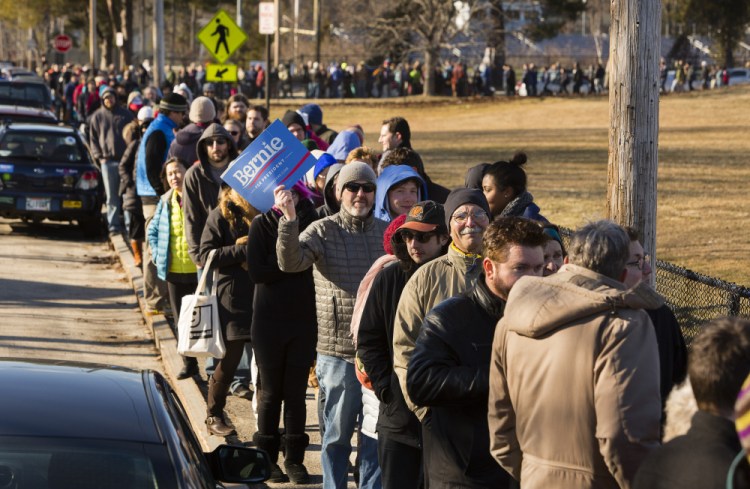One of the best things about Maine is its robust political culture. We’re serious about voting. We work hard to make sure our election laws are fair and inclusive. We vigorously fight efforts to keep eligible voters from the polls. We lead the way on innovations like Election Day registration, ranked-choice voting and Clean Elections.
So, it is no surprise when tens of thousands of Mainers turn up to participate in the presidential nominating contest. The trouble is, many places in Maine have outgrown our traditional caucus system.
In 2016, for example, Portland Democrats headed to caucus in record numbers, only to spend most of the day standing in a line that stretched from Deering High School, around acres of playing fields and into a nearby neighborhood. What should have been a couple of hours of well-structured grass-roots political activity and candidate discussion ended up being an endurance test. Some could not withstand the cold for so long; others could not stand up hour after hour, and still others had to leave so they could relieve their baby sitters. Most of those who did make it through the high school doors simply filled out an absentee caucus form and left it to be counted when the precinct caucuses began, three hours late.
In larger cities like Portland, Bangor and Lewiston, the valuable role that caucuses are supposed to play in building party strength doesn’t pan out. Maine people will do a lot in order to be counted, but in the end most people really just want to vote. It is a small subgroup that relishes the opportunity to debate the candidates’ merits, sign up for committees, run for delegate seats and get deeply involved with party activities.
Caucuses can be terrific and valuable. But they are a terribly inconvenient way to vote.
Great turnout is usually a good problem to have, and party organizers do their best to handle the logistical difficulties that result from huge attendance. But when high participation undermines the event itself, it’s time to examine alternatives that would better serve voters.
Soon after the 2016 caucus debacle, then-state Sen. Justin Alfond introduced a proposal to re-establish a presidential primary, and it passed almost unanimously. Unfortunately, it was not funded and so did not go into effect. The Legislature has another chance this year, and I strongly encourage it to pass the bill.
A presidential primary, to be held early in March, will serve Maine well. Every eligible voter who wants to participate can simply vote in person or by absentee, just like in every other election. Experienced voting officials, under the supervision of the Secretary of State’s Office, will conduct the election with the order and accountability we expect.
Without a doubt, a presidential preference primary will enjoy far greater turnout among voters around the state. Caucuses, even at their peak, capture only a small percentage of eligible voters. There are just too many barriers, including the time, inconvenience and public nature of participation. Being able to cast a private ballot in a familiar process will encourage voters to participate, and the result will more accurately reflect our preferences.
Make no mistake: Caucuses are still important and will remain so. Those of us who love politics will continue to caucus and participate in our local, county and state party committees. If the caucuses don’t have to serve as polls for the many folks who simply want to vote, they will be far more manageable and meaningful for those who show up.
Today, over 20 candidates are pursuing the 2020 Democratic nomination for president. Each and every one has passionate supporters. Perhaps that number will shrink by next March, but even then many thousands of Maine people will want to weigh in. Some will want to caucus and make the case for their candidate in person. Many, many more will simply want to vote.
I fervently hope that Maine legislators see the wisdom in providing for both voting and caucusing. Let’s return to a presidential preference primary and keep the caucuses for those who want deeper engagement. Let’s preserve what’s best about Maine politics, but adopt an inclusive, accountable and convenient system for choosing presidential nominees.
Send questions/comments to the editors.



Comments are no longer available on this story